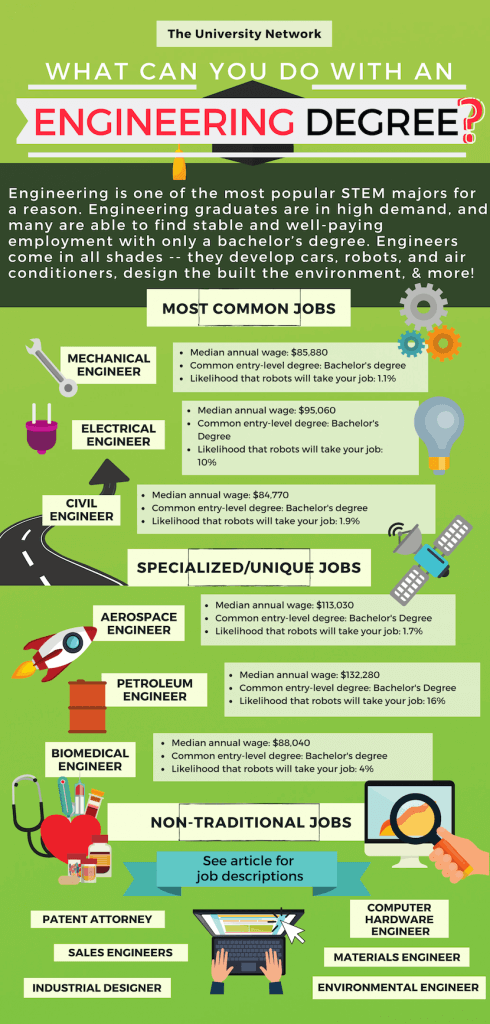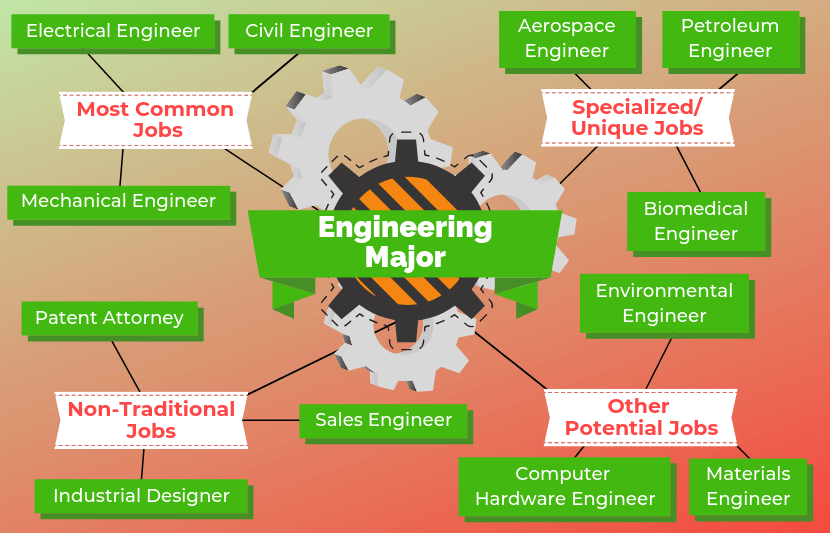Engineering is one of the most popular STEM majors for a reason. Engineering graduates are in high demand, and many are able to find stable and well-paying employment with only a bachelor’s degree. Engineers come in all shades — mechanical engineers who develop cars, robots, and air conditioners; civil engineers who design the built environment; petroleum engineers who devise methods to extract oil and gas from beneath the earth’s surface, etc. All play an important role in shaping the world we live in.
Here’s a list of 12 jobs for engineering majors:
Most Common Jobs for Engineering Majors
1. Mechanical Engineer
A broad umbrella term, mechanical engineers may work on a variety of mechanical and thermal products and systems. They might work on creating HVAC technology, generators, cars, or even robots. Mechanical engineers must be proficient in math and physical sciences, and because computers are integrated into many mechanical products and technologies, they should have a base understanding of computer science. Mechanical engineers also must be able to use computer-assisted design and engineering software. To become a mechanical engineer, you will need at least a bachelor’s degree in engineering and some experience, which can be gained through internships. While entry-level mechanical engineering positions do not require licensure, managerial positions require a Professional Engineering (PE) license, which can be attained after 4 years of work experience.
Median annual wage: $85,880
Common entry-level degree: Bachelor’s degree
Likelihood that robots will take your job: 1.1%
2. Electrical Engineer
Electrical engineers design, develop and oversee the production of electrical equipment and products, which could be anything from electrical components to electric motors to communication systems. Electricity shapes the world we live in, and electrical engineers can be found working on countless different kinds of projects for drastically different companies and organizations. To become an electrical engineer, you will need at least a bachelor’s degree in engineering and some experience, which can be gained through internships. While entry-level mechanical engineering positions do not require licensure, managerial positions require a Professional Engineering (PE) license, which can be attained after 4 years of work experience.
Median annual wage: $95,060
Common entry-level degree: Bachelor’s degree
Likelihood that robots will take your job: 10%
3. Civil Engineer
Civil engineers design the world in which we live, designing and developing infrastructure. They might work on roads, buildings, bridges, highways, public transportation, sewage systems, power supplies, etc. They are responsible for developing the plans and overseeing the construction of these projects, and working to manage costs, ensure the stability of the structures, and comply with local, state and federal regulations. Entry-level employment in civil engineering positions typically only requires a bachelor’s degree, but managerial positions frequently require an advanced degree and a Professional Engineering (PE) license, which can be attained after 4 years of work experience.
Median annual wage: $84,770
Common entry-level degree: Bachelor’s degree
Likelihood that robots will take your job: 1.9%

Specialized/Unique Jobs for Engineering Majors
4. Aerospace Engineer
Aerospace engineers are applied scientists who spend their days developing various technologies to be used in aircraft, spacecraft, rockets, satellites and missiles. They use their knowledge of physics, advanced mathematics and computer science to design, produce and test new aerospace technologies and ensure that they meet regulatory guidelines. Typically, they specialize either in aeronautical (aircraft) engineering or astronautical (spacecraft) engineering, and may be employed by a private aerospace manufacturer or by the federal government. A bachelor’s degree is often enough to find entry-level positions in the field. Research and development positions may require a master’s degree or a doctorate.
Median annual wage: $113,030
Common entry-level degree: Bachelor’s degree
Likelihood that robots will take your job: 1.7%
5. Petroleum Engineer
Petroleum engineers work primarily for oil and gas companies, developing methods and technologies for extracting oil and gas from the earth. When oil and gas deposits are discovered, petroleum engineers work with other experts, like geologists, to determine the extraction costs and develop efficient methods to pump out the oil or gas. They also oversee the extraction of operating wells and develop new or more effective extraction techniques. Once a well has dried up, so to speak, they are responsible for sealing the well and disposing of waste. A bachelor’s degree in engineering — particularly petroleum engineering — is enough to prepare aspiring petroleum engineers for entry level positions.
Median annual wage: $132,280
Common entry-level degree: Bachelor’s degree
Likelihood that robots will take your job: 16%
6. Biomedical Engineer
Biomedical engineers design and construct new technologies to be used in medicine and health care. They may design anything from new computer systems for hospitals to replacements for internal organs or false limbs. The job requires a strong understanding of multiple scientific fields — biology, chemistry, computer science and engineering, in particular. Many biomedical engineers find employment with a bachelor’s degree in engineering, biomedical engineering, or bioengineering, although advanced degrees are also common.
Median annual wage: $88,040
Common entry-level degree: Bachelor’s degree
Likelihood that robots will take your job: 4%
Non-Traditional Jobs for Engineering Majors
7. Patent Attorney
Patent attorneys work at the intersection of science and law. These legal experts assist inventors with every aspect of the patent process. This job begins with learning about the invention and its specifications, and researching similar inventions to ensure that it qualifies for a patent. Patent attorneys then guide their clients through the patent application process and often complete and file the patent application. They also act as an intermediary between the client and the U.S. Patent and Trademark Office (USPTO) and will represent their clients in cases of patent infringement, appeals, or challenges to an invention’s license. Patent agents must complete their undergraduate degree in a natural science or engineering, attend and complete law school, and pass the bar exam in the state in which they wish to practice.
Median annual wage: $119,250
Common entry-level degree: Juris Doctor (JD)
Likelihood that robots will take your job: 4%
8. Sales Engineers
Sales engineers work on behalf of companies that produce complex scientific and technological products to sell their products to businesses and to maintain their clients’ satisfaction. They must have a thorough knowledge of their employers’ products and how they operate. They often deliver presentations to explain the use and benefits of their products and work with their clients to install and sometimes modify the equipment based on their specific needs. Typically, sales engineers work with sales representatives, who are usually responsible for reaching out to buyers and closing deals, while sales engineers offer their technical expertise. A bachelor’s degree in engineering or a related science is typically required to become a sales engineer. You can also bolster your resume with coursework in business or marketing.
Median annual wage: $98,720
Common entry-level degree: Bachelor’s degree
Likelihood that robots will take your job: 0.4%
9. Industrial Designer
Industrial designers draft and develop all sorts of manufactured products, which may include anything from cars to smartphones to toasters. Working at the intersection of art and engineering, they take product ideas and create user-friendly and appealing designs. They often work on diverse teams with scientists, engineers and marketers, and design new products and work to improve on past models. Industrial designers typically need only a bachelor’s degree, but their coursework must include a mix of both engineering and art classes. They must also be proficient in 3D rendering and design software. Aspiring industrial designers also need a strong portfolio of design projects when applying to jobs.
Median annual wage: $65,970
Common entry-level degree: Bachelor’s degree
Likelihood that robots will take your job: 4%
Other Potential Jobs for Engineering Majors
10. Computer Hardware Engineer
Computer hardware engineers are engineers who develop computer hardware — components like circuit boards, memory devices and processors. They are tasked with designing, developing and testing new hardware. To attain an entry-level position in the field, you will typically need a bachelor’s degree in computer science or electrical engineering. Because computer hardware engineers often have to work with software, it is generally expected that hardware engineers will have a solid understanding of computer programming.
Median annual wage: $115,120
Common entry-level degree: Bachelor’s degree
Likelihood that robots will take your job: 22%
11. Materials Engineer
Materials engineers apply their expertise in engineering, physics and chemistry to develop and improve a wide range of materials, such as plastics, ceramics, glass, metals, composites, and other natural and man-made materials. Materials engineers have developed groundbreaking new materials, such as aerogel, vantablack and graphene, which can be used in a wide variety of technologies and products. Typically, materials engineers will specialize in a specific type of material. Materials engineers must have at least a bachelor’s degree in materials science and engineering or a related field of engineering. Materials science degrees typically involve interdisciplinary coursework across the sciences and math. A diverse field, materials engineers may work next to physicists, chemists and engineers of various education levels.
Median annual wage: $94,610
Common entry-level degree: Bachelor’s degree
Likelihood that robots will take your job: 2%
12. Environmental Engineer
The environmentally-conscious engineering major might pursue a career as an environmental engineer. This multidisciplinary branch of engineering incorporates biology, chemistry and environmental science. Environmental engineers might work on a wide range of projects relating to environmental health and sustainability. This could include developing new recycling programs, strategies and methods. It could also include developing renewable energy technologies and systems like dams or large-scale water filtration systems. A bachelor’s degree is necessary for entry into the field, and some employers may seek out candidates with master’s degrees. Leadership and management positions require a Professional Engineering (PE) license, which can be attained after 4 years of working in the field.
Median annual wage: $86,800
Common entry-level degree: Bachelor’s/Master’s degree
Likelihood that robots will take your job: 1.8%
10 Famous People Who Studied Engineering
- Neil Armstrong
- Rowan Atkinson (Mr. Bean)
- Jeff Bezos
- Michael Bloomberg
- Jimmy Carter
- Kalpana Chawla
- Tim Cook
- Charles Koch
- Bill Nye
- Carlos Slim
To explore options for other majors, click here.



